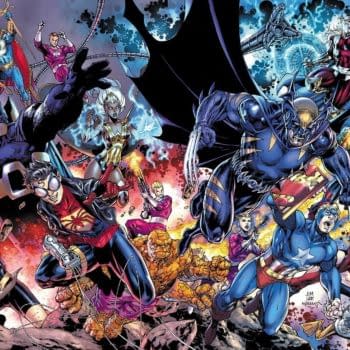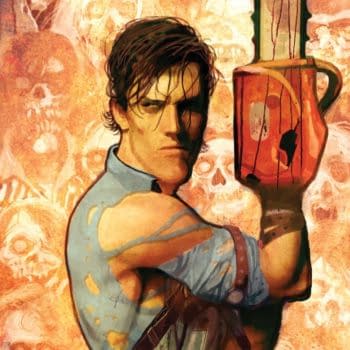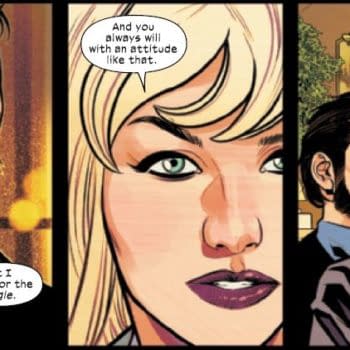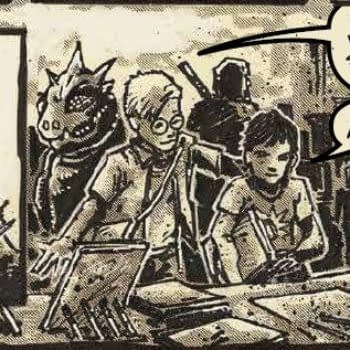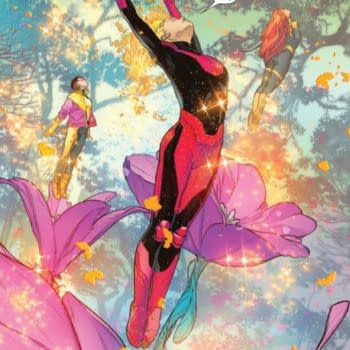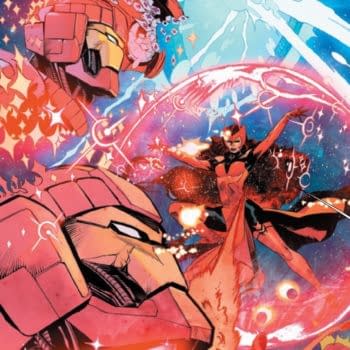Posted in: Comics | Tagged: Benjamin Percy, Comics, dynamite, entertainment, Farbice Sapolsky, Intertwined, james bond
Benjamin Percy Grills Fabrice Sapolsky About The Intertwined Finale
Dynamite has sent us a new writer-2-writer interview with Green Arrow and James Bond writer Benjamin Percy asking questions of Intertwined writer Fabrice Sapolsky about the finale of his series. Cover by Olivier Coipel.

FABRICE SAPOLSKY: I certainly have seen most of the kung fu and action movies available when I was a kid. My brother and I were three times a week at the video club when I was a teenager. And there was a special: you rented a movie for 3 hours or less and had a 50% rebate. We watched a lot of movies in those times! I think, growing up in the 80s, with so much pop culture available that the previous generations didn't have, either you were totally immune to them or you were a pop culture sponge. Guess I was the second kind.
That said, for the Martial arts background itself, that's Fred. As I never fail to mention, his whole family is invested in Kung Fu. His father was a teacher and so was his grandfather. He still practices it. Since I started developing Intertwined, I wanted to make sure the Kung Fu was credible unlike so many other comics. Fred brings that talent on top of all the rest.
BP: There seems to be an endless debate on social media about crediting writers versus crediting artists. I've talked to my pal Patrick Zircher about this, and we both said, "storytellers," is an ideal way to attribute the collaborative relationship of creating a book…which is how your name appears alongside Fred Pham Chuong's in the credits. Anything to add to the conversation?
FS: First, let me say I love Pat Zircher. He drew beautiful covers for my Spider-Man Noir series at Marvel and did an amazing pinup for Intertwined that we saved for the Kickstarter backers. I agree with you to a certain extent. For a lack of better words, I chose storytellers. I write the series. I came up with the concept and the characters. But I gave enough room to Fred to add his own ideas and slightly influence the series. I take a lot of pride of being a writer who welcomes his artists' contributions and suggestions. Comics are collaborative by design, whatever the combination might be. Right now, I'm about to work on other projects where artists came up with stories and concepts and they asked me to help them strengthen them. To rewrite, to create stronger dialogue. I know many writers wouldn't do that. But I don't think it matters where the ideas come from as long as they're good. To me it's closer to what Stan and Jack were doing. That approach has almost disappeared. Credits should reflect the dynamics of a team. It's like how colorists used to be described. Back in the day, they weren't even mentioned in some comics. I remember how Marvel changed the game when guys like Richard Isanove who brought so much to the art, more than just colors, were finally labeled color artists. The color artists are fundamental to our comics. Just like the artists can be writers and writers can be artists. I guess there's no ideal way to attribute credits. As long as the whole creative team feels rewarded and respected by the credits, then it's fine by me.
BP: You've got a big melting pot of characters in the book. Tell me about your approach to multi-culturalism and storytelling.
FS: This is a very big question! (laughs) Intertwined is a story told from the perspective of an immigrant in America. Which is also my case. When you're raised in a different culture, you don't approach, and sometime have hard time understanding how the race factor is such a big issue in the U.S. Especially when the main character in Intertwined is a young twentysomething guy who never traveled outside Hong Kong. So when he arrives, he doesn't immediately look for people like him. He talks to everyone. He asks questions. He doesn't feel weird. I wish I had the space to describe everything I felt when arriving in this country through my character's eyes. How I came to understand things, or not understanding others. Where I come from, France, and especially when I grew up, nobody talked about multi-culturalism or race. It was always a private matter. People would live their culture in their homes, but once in the outside, there was just French people. At school, you wouldn't tell where your parents or grandparents were from. You wouldn't ever talk about religion or anything like that. I had Arab friends. I had black friends. But we would never talk about it. It was unspoken. And we were never defined by this. We spoke the same language. Loved the same music. The same movies. Lived in the same buildings. And that was it. It's only when I hit adulthood that I saw the differences. And when I first traveled to New York. I was 22 years old. This is where I discovered that there was another way of approaching differences. In Europe, for a long time, we were raised with the idea that the nation was superior to every language, religion or culture. In the U.S., you came from wherever country you were with your cultural baggage and continued living with it in your new country living next to the other cultures but only mixing up in a limited fashion. Communities interacted with each other, they didn't mix. Maybe it's in my head, but when I came back to New York a few years later, I noticed a change. More interracial couples. More interfaith relationships. Today, even though you can still feel communities don't always understand each other, there's more and more of a multi-cultural feel. Closer to what I experienced in France. But this is New York. And New York is not the United States. Creating Intertwined, I asked myself this question every single page: "my audience is mainly American. How are they going to react?" I have a friend, a well-known artist in this industry, who turned down Intertwined before I met Fred, and said: "I like your project, but I don't want to be associated with polemics". Well… For starters, there was no polemics (laughs). But even if there were, comics aren't just empty entertainment. Diversity, inclusion are words a lot of people use today here in America. They use it … with an American perspective. My take is obviously different because I'm not American. And I think it deserved to be heard and read. Because there's not just one way of seeing things. There are many.
Has it influenced my storytelling? Hell yes. I knew from the start that differences would be the real stars of the series. We have Asians, of course. We have Haitians. We have a Jewish Chinese crossdresser. We have Puerto Ricans. We have a closeted bi-racial gay couple. This is life. This is New York. And all this is seen through the eyes of our hero who's an immigrant. I'll give credit to Bruce Lee for being the main inspiration, both in his movies and his life. Bruce was a Chinese American guy. He was born in the U.S., raised in Hong Kong. He came back to the U.S. but was confronted with discrimination in Hollywood. He was also criticized in his own country for marrying an American non-Asian girl. But Bruce Lee didn't care. He had no boundaries in his mind nor his heart. He went against tradition which states that Kung Fu can't be taught to non-Chinese or non-Asian. He made Kung Fu international, even created his own style, Jeet-Kune-Do, still taught today. He tore down all of walls. Fought a lot of crap in his too-brief life. Bruce Lee has been a model for Fred and myself. Intertwined is our way of telling the world that we haven't forgotten how right he was. At a time when America and other countries in Europe are tempted by isolationism, this little comic of ours is a breath of fresh air. We humbly point out that there's another way of seeing things than nationalism. Comics are definitely entertainment. But they come with a point of view.
BP: It's interesting that your "villain" is fighting on behalf of the earth and protecting the five elements. What do you hope for when characterizing the bad guys in your books?
FS: You mean, the Spirit of Metal? He's the villain. He thinks he's right and all the others are wrong. He thinks what his institution has become is a joke. He wants to bring back Wu Xing the way it used to be. He's a populist. Reminds you of someone? Yeah. These kind of individuals have polluted our societies for decades, sometimes taking power by fooling the very people who elected them. In our case, Spirits are not elected, they are chosen. But you get the point. Those who try to take power and abuse it use morals as an excuse to achieve their goals. In Intertwined, Nei Chang, the Spirit of Metal, pretends he wants to save Wu Xing by taking it back to "its roots", while all he wants is power for himself. He's a very modern villain. He's using the system against itself by claiming he's the true heir of Wu Xing. It's the first time that I draw so much from politics and reality to portray a villain. In One-Hit Wonder, it was a father/son issue born out of manipulation among mobsters. In Spider-Man Noir, it was the underworld, led by freaks, trying to take over the real world or Nazis experimenting on people. Intertwined is the most politically charged comic book I ever wrote. That's one of the reasons why the action takes place in 1971. I didn't want to make it too obvious that we're talking about issues the world experiences today (laughs)… Guess I outed myself!
BP: There are a lot of quiet, character-building moments in this issue — but also some seriously wild brawls. How do you go about staging fight scenes and action set-pieces in your scripts?
FS: This is the magic between Fred and myself. He deals with the fights, I deal with the characters and emotions. Then we put all that in a blender and it makes what you read. Seriously, we talk about everything. At first, I was setting the course. Fred had to learn the characters, understand them. But after issue #3, he took a more active role and we started discussing, sometimes for long hours, almost all the scenes of the book.
For this particular issue, #6, we had to work against the clock as we were late. A lot of material was cut from the version you saw. We really hope we can bring it back in further editions. We cut some fight and, mainly, some character-centric pages that I thought were very, very important. If you don't know anything about it, you can't possibly guess what and where we cut. But we know. And for those who followed the series, they'll be left with tons of questions regarding the characters. We haven't failed to address those issues. We just didn't have time to have them drawn and colored in the book. But most of it was written. That's comics. You have a schedule. You're depending on other talents and life often gets in the way. It's only when you're doing everything all by yourself that you're the only one to blame if something wrong happens. That's why I really like working with another brilliant mind. When I was doing Spider-Man Noir with Dave Hine, it was the same kind of process. We were both bringing tons of ideas to the table and we only kept the best ones. Sometimes it would be my concepts, sometimes not, but in the end, it doesn't matter. It enriches the comics even though you can sense a form of dualism in them. In Spidey Noir, it was Noir and Pulp. In Intertwined, it's Kung Fu and Noir. It's fair to say that I often bring the Noir part to those comics, but not exclusively. The rest, as I said, is magic.









